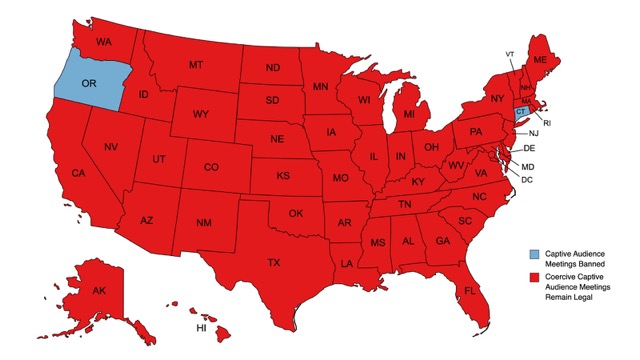Captive audience meetings, also known as mandatory meetings, have been a contentious issue in workplaces for years. Critics contend that they create a hostile work environment and coerce workers into opposing their right to a union. As a result, some states are starting to take action and ban captive audience meetings altogether.
Oregon was the first state to ban captive audience meetings in 2010, setting a precedent for others to follow. Under the law, an employer may not discharge, discipline or otherwise penalize an employee, or threaten to do the same, because the employee “declines to attend or participate in an employer-sponsored meeting or communication with the employer… if the primary purpose of the meeting or communication is to communicate the employer’s opinion about religious or political matters.” In 2022, Connecticut became only the second state to ban captive audience meetings.
Proponents of banning captive audience meetings argue that they create a one-sided dialogue in which employees are unable to voice their concerns or opinions. These meetings are designed to coerce workers into opposing their right to a union and to discourage them from organizing. By removing the option for employees to opt-out of these meetings, employers are effectively silencing their workers and denying them the opportunity to advocate for their own interests.

Moreover, captive audience meetings can also create a hostile work environment, particularly for employees who may hold differing political or religious views than their employer. These meetings often involve discussions about controversial topics that may not be relevant to the workplace, such as abortion or immigration, and can lead to tension and conflict between coworkers.
The ban of captive audience meetings in Oregon has proven to be a successful model for other states to follow. Since the ban, Oregon has seen a significant decrease in the number of anti-union campaigns and an increase in union membership. The state has also seen a reduction in workplace discrimination and harassment, as employees are no longer forced to attend meetings where these issues may be discussed inappropriately.
Captive audience meetings have long been a contentious issue in the workplace, and it is time for all states to take action and ban them altogether. These meetings create a hostile work environment, coerce workers into opposing their right to a union, and deny employees the opportunity to advocate for their own interests. Oregon’s successful ban on captive audience meetings serves as a model for other states to follow in protecting the rights of their workers.